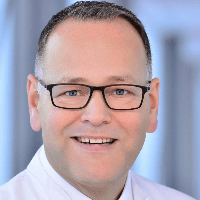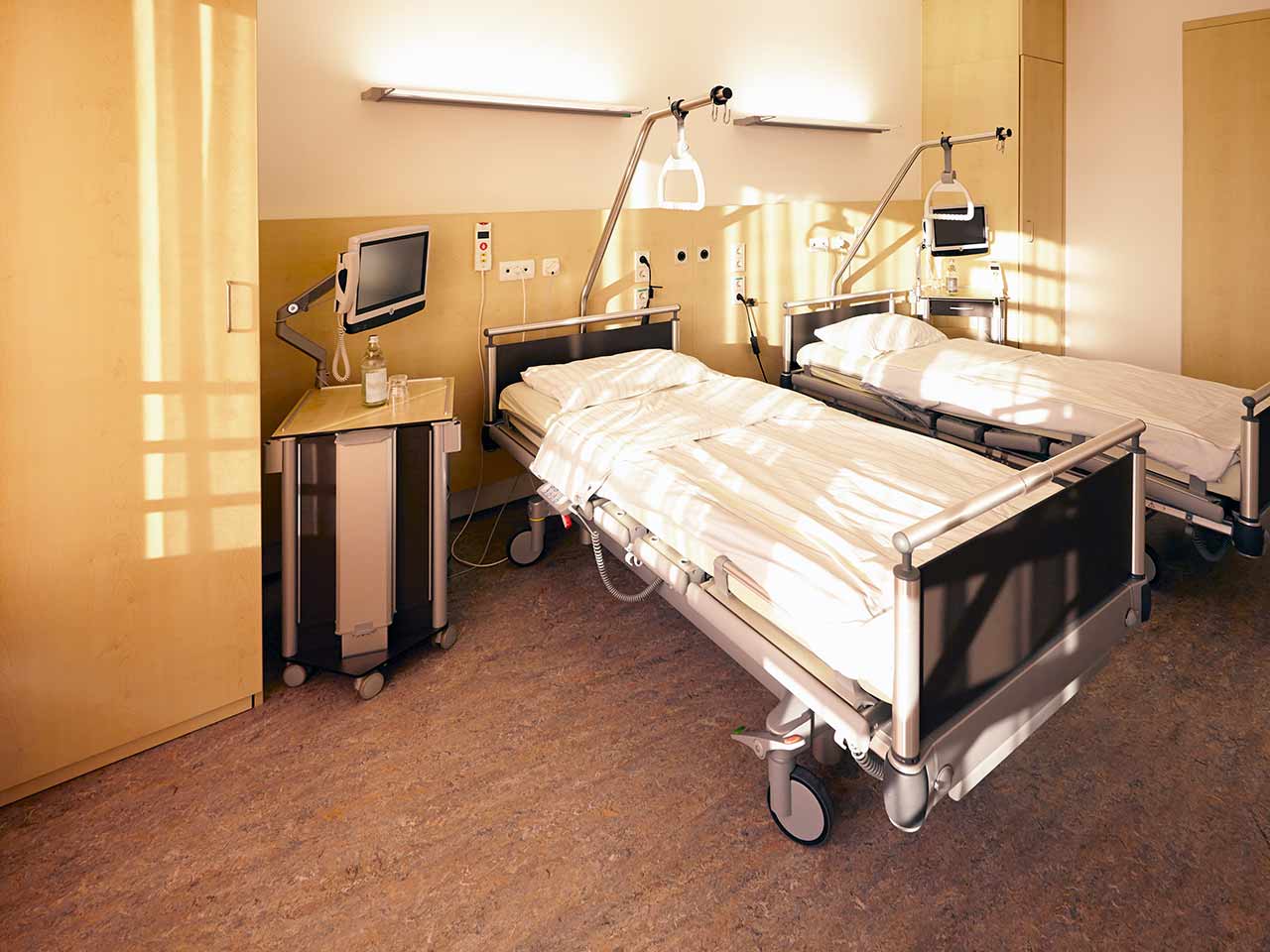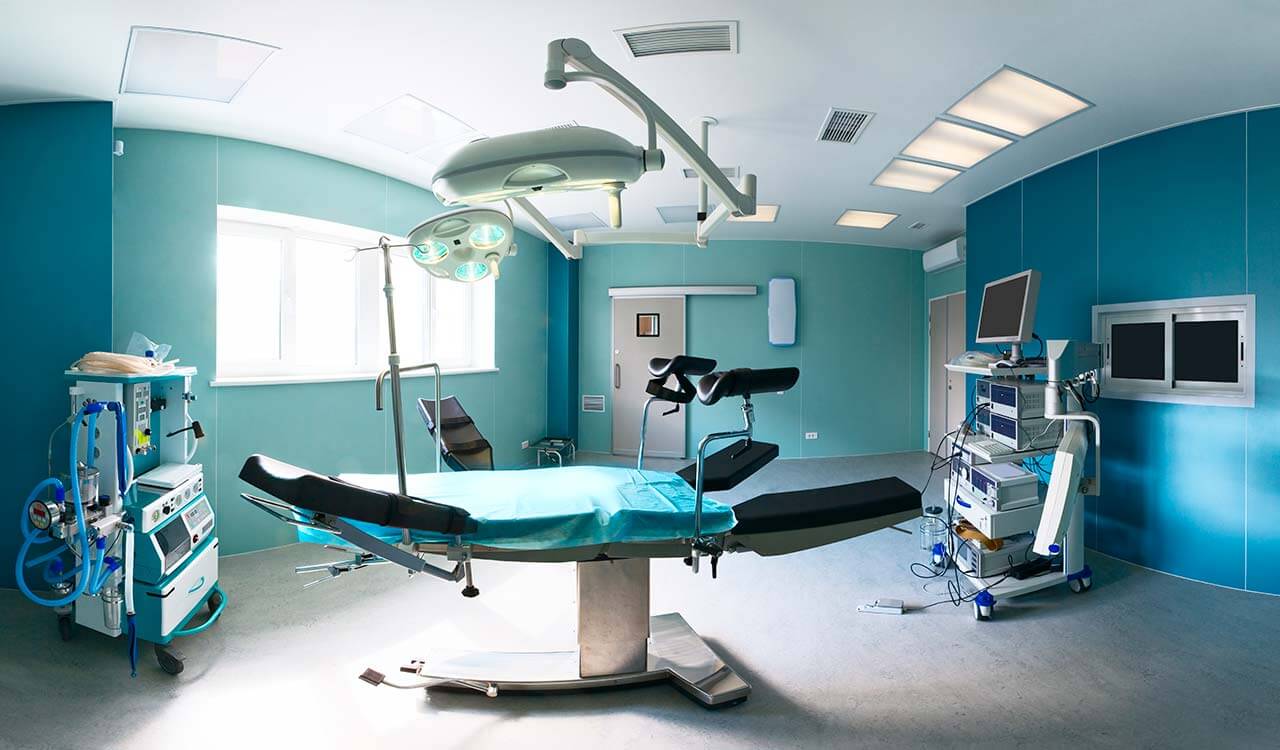
The program includes:
- Initial presentation in the clinic
- clinical history taking
- physical examination
- laboratory tests:
- complete blood count
- biochemical analysis of blood
- tumor markers
- indicators blood coagulation
- procto-/ rectoscopy (static, dynamic)
- rektummanometrie
- endosonography
- defecography (if indicated)
- neurophysiology (if indicated)
- needle EMG of N. pudendus
- CT/MRI abdomen
- colonoscopy
- preoperative care
- sphincterotomy
- symptomatic treatment
- control examinations
- the cost of essential medicines and materials
- nursing services
- nutrition recommendations
- full hospital accommodation
- explanation of future recommendations
Required documents
- Medical records
- Endoanal ultrasound (if available)
Service
You may also book:
 BookingHealth Price from:
BookingHealth Price from:
About the department
The Department of General, Abdominal and Endocrine Surgery at the Helios Hospital Hildesheim performs the full range of surgical interventions on the abdominal organs and thyroid gland. The competence of the department's surgeons also includes hernia repair, including the treatment of inguinal hernias, epigastric hernias, diaphragmatic and incisional hernias. Special attention in the clinical practice of the medical facility is paid to the treatment of oncological diseases: esophageal, stomach, liver, pancreatic and colon cancers. The department is certified in accordance with the standards of the German Cancer Society (DKG). Thanks to the availability of the very latest technologies and the introduction of innovative surgical procedures into clinical practice, the department's specialists provide their patients with optimal medical care. Many surgical interventions are performed using sparing minimally invasive techniques, which allows patients to recover and return to everyday life as quickly as possible. The department's team of surgeons and nursing staff regularly undergo advanced training in order to keep up with the times and offer patients the most modern treatment methods. The Chief Physician of the department is Prof. Dr. med. Frank Lehner.
The department's specialists are distinguished by their successful clinical experience in the treatment of colon diseases. The doctors most often deal with the treatment of colon cancer, diverticulosis, colon polyps and chronic inflammatory bowel disease (ulcerative colitis and Crohn's disease). These diseases are treated in close cooperation with gastroenterologists. The first-line treatment is usually drug therapy, and only if it is ineffective the specialists resort to surgery. The team of the department's surgeons has a perfect command of both classical surgical techniques and modern minimally invasive ones. The optimal type of the surgical procedure is determined individually for each patient, but preference is always given to sparing operations that exclude extensive laparotomy. The surgical access for such interventions involves only a few small skin incisions, so the patient does not need a long course of postoperative recovery.
The department often admits patients with esophageal and stomach diseases. The most common benign pathologies are gastroesophageal reflux disease, esophageal achalasia and diverticulitis. The department's surgeons often perform surgery for esophageal and stomach cancers. Depending on the particular clinical case, the type of tumor, the stage of cancer and the presence or absence of metastases, the most effective surgical intervention is performed. The department's surgeons always strive to preserve the anatomical integrity and function of gastrointestinal organs as much as possible, and therefore they perform minimally invasive operations, if possible. Surgery is complemented by chemotherapy and/or radiation therapy, which are conducted by highly qualified specialists before or after surgery, depending on the clinical indication.
The surgical treatment of pancreatic diseases takes an equally important place in the clinical practice of the department's specialists. The key focus is on the treatment of benign and malignant pancreatic tumors, as well as on the treatment of inflammatory processes accompanied by stenoses of the pancreatic ducts and the formation of cysts. Gastroenterologists are actively involved in the therapeutic process. Depending on the complexity of the clinical case, the patient is appointed an optimal treatment regimen developed on an individual basis. During the surgical treatment, partial or total removal of the affected areas of the pancreas is often required. Prior to the surgical intervention, the attending physician holds a consultation, during which he tells the patient in detail about the upcoming operation and possible risks.
The department's therapeutic offer is complemented by the treatment of various liver diseases, including malignant ones. If the patient is diagnosed with a benign or malignant liver tumor, the specialists perform partial or total resection of the tumor and the affected areas of the organ. In most cases, the department's surgeons perform minimally invasive surgery to preserve liver function. The doctors of the medical facility also use radiofrequency ablation for cancer treatment. This procedure involves X-ray-guided introduction of electrodes into the liver and exposing the tumor to high frequency currents, which cause a significant increase in tissue temperature. The procedure results in the destruction of abnormal cells. For the patient's comfort, the procedure is performed under general anesthesia.
The main focus of the department's clinical activities in endocrine surgery is on thyroid surgery. The surgeons also perform operations on the parathyroid glands and adrenal glands. Whenever possible, endocrine surgery is performed using minimally invasive techniques. In addition, when performing endocrine operations, the specialists use modern neuromonitoring systems in order to preserve the anatomical integrity and function of the recurrent laryngeal nerve, which innervates the vocal cords, as well as adjacent nerve plexuses. The patients suffering from endocrine diseases are treated in interdisciplinary collaboration with the participation of specialists in nuclear medicine, radiologists, oncologists, radiation therapists and other physicians.
The department's range of surgical services includes:
- Surgical treatment of colon diseases
- Colon cancer
- Colon polyps
- Diverticulosis
- Chronic inflammatory bowel disease (ulcerative colitis and Crohn's disease)
- Surgical treatment of rectal diseases
- Hemorrhoids
- Anal fissures
- Anal fistulas
- Surgical treatment of esophageal and stomach diseases
- Esophageal and stomach cancer
- Benign esophageal and stomach neoplasms
- Gastroesophageal reflux disease
- Esophageal achalasia
- Diverticulum
- Surgical treatment of pancreatic diseases
- Pancreatic cancer
- Benign pancreatic neoplasms
- Inflammatory pancreatic diseases accompanied by duct stenosis and the formation of cysts
- Surgical treatment of liver diseases
- Liver cancer
- Benign liver neoplasms
- Cirrhosis
- Hepatitis
- Surgical treatment of endocrine disorders
- Thyroid disorders
- Parathyroid disorders
- Adrenal disorders
- Surgical treatment of hernias
- Inguinal hernias
- Epigastric hernias
- Diaphragmatic hernias
- Incisional hernias
- Surgical treatment of other abdominal and endocrine diseases
Curriculum vitae
Prof. Dr. med. Frank Lehner studied Human Medicine at the Eberhard Karls University of Tuebingen. This was followed by specialized training at the District Hospital Reutlingen, at the University Hospital Bochum and at the Hanover Medical School. Since 2004, Prof. Lehner has held the position of Senior Physician in the Department of General, Abdominal and Transplant Surgery at the Hanover Medical School. In 2012, the specialists had his habilitation and Venia legendi in surgery. In 2013, Prof. Lehner held the position of Managing Senior Physician in the Department of General, Abdominal and Transplant Surgery at the Hannover Medical School. Since 2016, he has held the position of surgeon at the Liver Cancer Center of the Oncology Center at the Hanover Medical School, and was also a member of the Steering Committee of the Claudia von Schilling Cancer Center at the Hanover Medical School. Since January 1, 2019, Dr. Frank Lehner has been heading the Department of General, Abdominal and Endocrine Surgery at the Helios Hospital Hildesheim.
Prof. Lehner enjoys an excellent reputation in cancer surgery, liver, biliary tract and pancreatic surgery, as well as in colorectal and endocrine surgery. In addition, the specialist has vast experience in sparing minimally invasive interventions.
Photo of the doctor: (c) Helios Kliniken GmbH
About hospital
The Helios Hospital Hildesheim positions itself as an advanced provider of high-quality medical services at the European level. The medical facility is an Academic Hospital of the Hannover Medical School, thanks to which it can successfully introduce the very latest medical achievements into clinical practice. The hospital is distinguished by the excellent quality of diagnostics, highly effective treatment of pathologies of any severity and the best patient care based on understanding and humane attitude. The history of the medical complex dates back to 1838, so it carefully honors traditions, but at the same time the hospital actively uses innovative diagnostic and treatment methods. The medical team of the hospital consists of more than 1,450 people. The hospital employs highly qualified doctors who are rightfully proud of their treatment outcomes.
The medical facility has 579 beds. The team of doctors working at the hospital treats more than 28,000 inpatients and about 80,000 outpatients every year. The patients from foreign countries often undergo diagnostics and treatment in the hospital, which confirms the excellent reputation of the medical center in the international arena.
The hospital offers highly specialized departments with different medical focuses, including oncology, cardiology, gastroenterology, gynecology, dermatology, otolaryngology, general and abdominal surgery, plastic and aesthetic surgery, traumatology, etc. Many medical fields are awarded with prestigious certificates, including German Cancer Society (DKG) certification, IQM certification, and others.
Photo: (с) depositphotos
Accommodation in hospital
Patients rooms
The patients of the Helios Hospital Hildesheim live in spacious and light rooms. The furnishings of a standard patient room includes an automatically adjustable bed with an orthopedic mattress, a bedside table, and a wardrobe for storing things. All patient rooms have telephone, radio and TV, as well as free Wi-Fi. For maximum convenience of patients, each room has an ensuite bathroom with shower and toilet.
If desired, the patient can stay in an enhanced-comfort room. Such rooms are distinguished by a more sophisticated design, and are additionally equipped with a safe, a minifridge and upholstered furniture.
Meals and Menus
The patients of the hospital are offered tasty and varied meals. Diet and vegetarian menus are also available. If the patient follows a special diet recommended by the attending physician, he will be provided with food cooked from approved products.
Breakfast is served buffet style: eggs, various types of cheese, sausage, buns, jam, vegetables. There are three set menus to choose from for lunch. Dinner is also served buffet style.
In addition, the hospital has a cozy cafe called Leckeria where one can have a delicious snack. The range of dishes includes light salads, hearty set meals, snacks, sandwiches, cakes, as well as tea, coffee and soft drinks. The terrace is open in the summertime.
Further details
Standard rooms include:
Television
All patient rooms have a TV set. The TV can be used with headphones – the patients can use their own headphones or ask for the headphones from the staff.
Religion
The patient can talk with a Christian priest at any time. Divine services are held every Sunday at 10 am (on the ground floor).
Other religious services are available upon request.
Accompanying person
During the inpatient program, the accompanying person can stay with the patient in a patient room or at a hotel of his choice. Our managers will help you choose the most suitable option.
Hotel
During the outpatient program, the patient can stay at a hotel of his choice. Our managers will help you choose the most suitable option.




